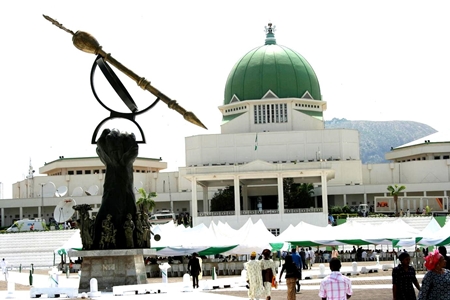
President Muhamamdu Buhari and the Minister of Petroleum Resources may be stripped of power to allocate oil blocs.This major change, it was gathered, was part of the Petroleum Governance Bill (PIGB) undergoing legislation before the Senate.
Chairman, National Assembly’s Joint Committee on Petroleum Industry Reforms, Senator Tayo Alasoadura, confirmed the development in an exclusive chat with this New Telegraph newspaper on the sideline of the ongoing Nigeria Oil and Gas (NOG) conference in Abuja.
He said that oil alloca-tion would, henceforth, be executed by the Nigeria Petroleum Regulatory Commission (NPRC) subject to ratification by the National Assembly. He said that the bill would be passed “by March or latest April”.
Alasoadura added that the aspect of the petroleum law, which gives the president and the minister the absolute power to singlehandedly give oil blocs to people, has been reviewed with the PIGB.
“What we are proposing is that the board of the Nigeria Oil and Gas Regulatory Authority to be formed through Senate legislation will meet, assess and recommend people for oil blocs and other things to Mr. President through the Minister of Petroleum Resources,” the senator said.
Corroborating Alasoadura’s view, a member of the PIB re-drafting committee disclosed that the Senate had successfully removed power of the president and oil minister to award oil blocs.
All the oil blocs in the country had, since independence, been allocated by the president and or Minister of Petroleum Resources as the case may be. He said: “The law that guarantees the president and/or the minister this authority is being revoked through PIB and the only reason that this will continue is if the President refuses to accent the bill.”
He said that what “we are to have is subject to ratification by the National Assembly!” Besides stripping the President of the power to allocate oil blocs, the Senate had on paper, through the PIGB, scrapped the Department of Petroleum Resources (DPR), the Petroleum Products Pricing Regulatory Agency (PPPRA) and Petroleum Inspectorate (PI), thereby creating a new body, the Nigeria Petroleum Regulatory Commission (NPRC). The NPRC would take over the functions of PI, DPR and PPPRA.
Many senators had said that the PIB, which is currently before them, would support the creation of this new commission that is expected to administer and enforce policies that are related to all aspects of petroleum operations in the country.
Also, if the new policy sees the light of the day, two new companies; the Nigeria Petroleum Assets Management Company and National Petroleum Company (NPC), would be established.
The NPC would be vested with certain assets and liabilities of the Nigerian National Petroleum Corporation (NNPC), just as the NPC, for instance, will operate as a full independent commercial entity.
Also as part of moves to unbundle the NNPC and the petroleum industry, the PIGB is proposing that the Ministry of Petroleum Resources be renamed as Ministry of Petroleum incorporated, while 30 per cent of the NNPC stakes would be sold through Independent Public Offer (IPO).
Senators at a four-day retreat on PIGB in Uyo, Akwa Ibom State capital, last year, were however, sharply divided on the powers vested on the president and the minister to take certain decisions on issues relating to the petroleum industry.
Alasoadura, who maintained that every action taken must be in tandem with the provisions of the constitution, said: “We cannot go outside the constitution.
If we cannot do that, we must ensure that whatever we do is in tandem with the provisions of the constitution.
“We must be careful about semantics. A ministry was created to supervise the oil industry. We must not take away the entire powers of the ministry.”
Alasoadura’s position was countered by his co-chairman, Senator Bassey Albert Akpan, who warned against arrogating too much power to the president or the minister.
Minister of State for Petroleum Resources, Dr. Emmanuel Kachikwu, had earlier confirmed plans to sell 30 per cent of the NNPC’s assets subject to the passage of PIGB.







